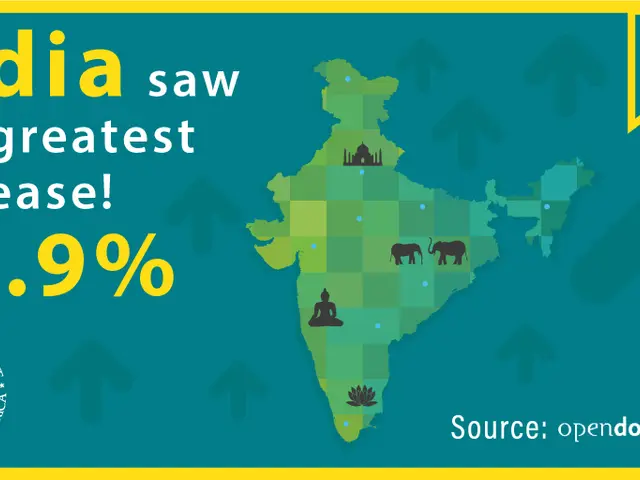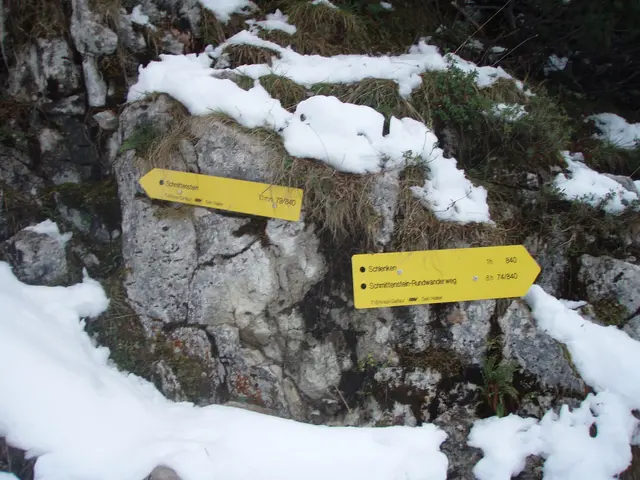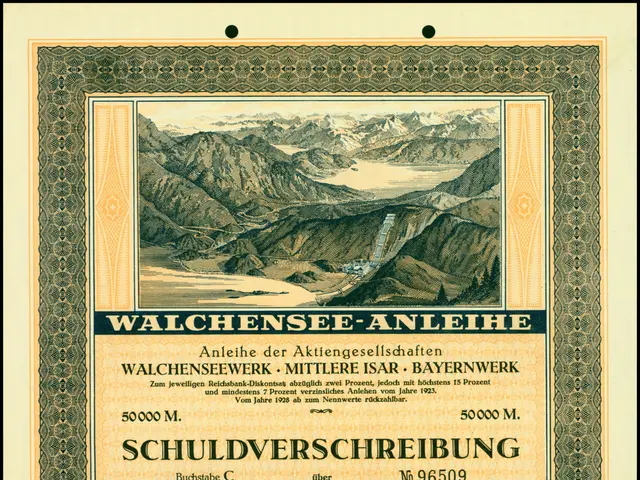Struggling Journeys of Haitian Migrants: An Unending Odyssey of Trials
Laughing at the Unjustified Hate: The Uncalled-for Attack on the Haitian People
I found myself chuckling when I watched the infamous debate between Donald Trump and Kamala Harris back then. Trump said, "They [Haitian people] eat dogs. They eat cats. They eat the pets of the people that live there." My parents laughed along with me when I made lighthearted jokes about the absurdity of his statement, but it was clear that this wasn't a laughing matter for them. The hostile rhetoric directed at my people didn't truly hit home until later.
It wasn't until I was scrolling through comments online that I realized the brutal truth. Many Americans genuinely believed his vicious words. I saw people reinforcing his statements, writing "They actually do this" and "How did we let these people in" - comments that sent a shiver down my spine. The push to deport Haitian immigrants seemed to happen suddenly and without warning. For me, it struck a nerve - after all, I had grown up alongside these people. It marked a change that went deeper as Trump took office and remains to this day.
But this wasn't the first time our first nation faced prejudice and discrimination.
Our Roots, Shaped by an Unending Struggle
Located in the heart of the Caribbean on the western half of the island of Hispaniola, Haiti has a long, fraught history and hasn't tasted true freedom since Columbus claimed the island for Spain in December of 1492. The original inhabitants - the Taino people - were enslaved and forced to work in gold mines under cruel and inhumane conditions. By the time the Spanish ceded the western side of the island to France in 1697, the Taino had been either enslaved or exterminated, leading to the importation of African slaves around 1570 to replace the fallen workforce.
The French kept control of the entire island until 1697, when they ceded the western side to become what would later be known as Haiti. This new land quickly became one of France's most valuable colonies, thanks to its rich resources of coffee, cocoa, cotton, and, most notably, sugar. By the late 1700s, the slave population had grown past half a million, making up 90% of the colony. The remaining 10% consisted of European slave owners and the social class affranchis (emancipated slaves and people of mixed European and African descent). This imbalance, coupled with the news of the French Revolution, which resulted in the abolishment of slavery in France but not in Haiti, sparked the most successful slave revolt in history.
Led by the freed slave Toussaint Louverture, the revolution of 1791 resulted in the French being driven out, and Napoleon's 13-year attempt to retake the territory was met with fierce resistance. Upon officially declaring independence in 1804, the land was renamed Haiti (Ayiti in Creole, the official language of Haiti) and remained free for the next 21 years - until 1825, when French warships appeared on its coast without warning.
The French demanded repayment for their loss of income and labor, asserting that Haiti owed 150 million gold francs - a crippling debt for a developing nation. Given no choice, Haiti allocated around 80% of their national budget to the French for the next 122 years. The debt was eventually renegotiated to 90 million francs, but Haiti was forced to take numerous loans from other countries to keep up with the payments.
The Present Day Struggle
Never recovering from the massive debt, Haiti has remained one of the poorest countries in the world for centuries, with the average citizen making less than two dollars a day. Plagued by political instability and natural disasters, Haiti has had 46 leaders since Toussaint, with most not lasting a full term in office. The most recent president, Jovenel Moeise, was assassinated in 2021 after mass protests over accusations of corruption.
Since Moeise's death, Haiti has been in a state of limbo, having gone through five interim leaders. The latest, Chairman Fritz Jean, was inaugurated on March 7th, 2025. Despite the ongoing turmoil, one thing remains constant: the endemic violence and gang warfare that plague Haiti's streets.
While some might consider the violence to be self-inflicted, the truth is that the weapons used in these conflicts come from the United States. There are no factories dedicated to the production of arms or ammunition in Haiti, nor does the country possess the resources necessary to build them. This violence is largely due to smuggling and the poor gun control restrictions in places like Florida, where most of the weapons bound for Haiti originate. The solution lies not in blaming the victims, but in increased scrutiny of these criminal networks and changes in legislation to prevent these weapons from reaching Haiti in the first place.
In addition, Haiti's vulnerability to natural disasters, including floods, droughts, hurricanes, earthquakes, and tornadoes, leaves its already fragile infrastructure in ruins. Thousands of people suffer and lose their homes each time disaster strikes. It is no wonder that people like myself seek to escape these conditions in search of a better life.
The United States and Its Complex Relationship with Haiti
The United States has a long and intricate history with Haiti, marked by intervention, aid, security concerns, and humanitarian efforts. In 1915, President Vilbrun Guillaume Sam was assassinated by the Haitian people, primarily due to his connections with the United States. In response, the U.S. Marine Corps invaded and occupied Haiti, supposedly in the name of stability. In reality, this occupation resulted in the mass deforestation of Haitian land due to the unrestricted activities of American companies and the widespread abuse of Haitians.
The 1990s saw another spark in U.S. involvement when, under Bill Clinton, the U.S. launched an economic campaign that further crippled Haiti's infrastructure by flooding the Haitian market with cheap resources such as rice, peanuts, and fish - products that Haiti could produce in abundance. This campaign favored American manufacturers at the expense of local Haitian manufacturers, causing an economic collapse that continues to afflict the country today.
In 2004, the United States assisted in a military coup against President Jean-Bertrand Aristide, who was the first democratically elected president in Haitian history. This coup forced Aristide into exile and handed control to Boniface Alexandre, who was known for advocating for excessive police force and was reported on by the human rights organization Amnesty International for his militaristic policies and the danger he posed to the Haitian people. Aristide's ousting set Haiti back decades, leaving a power vacuum that continues to be exploited by U.S. interests.
The Continuing Struggle for Refuge
Since 1915, the United States has consistently maintained a rigid stance against Haitian migrants, with asylum seekers being detained at sea by the U.S. Coast Guard and sent to Guantánamo Bay. I spoke with Ninaj Raul, a prominent Haitian activist and co-founder of Haitian Women for Haitian Refugees (HWHR), an organization based in Flatbush, Brooklyn, dedicated to supporting Haitian refugees beginning their lives in the United States. As a translator, Ninaj found herself traveling to Guantánamo Bay on multiple occasions throughout the 1990s, working with lawyers, assisting refugees with credible fear interviews to assess their need for asylum, and working as a family health counselor.
Since the founding of HWHR, they have supported Haitian refugees in their journey to the United States. In her own words, "We provide them with information to help them start their lives in the United States by connecting them to social services. Most people come in here looking for immigration legal referrals. So we connect them to lawyers for free consultations to see if they qualify for representation to adjust their status or sustain it. Most people who come in have some form of status, even if it's temporary, but they were granted entry by the government."
This struggle has been ongoing, with crises leading to increased challenges for HWHR to provide safety and support for those in need of refuge. Ninaj recalls the wave of immigrants at the Mexican border in 2016, when Brazil began removing Haitians due to their humanitarian visa program after the 2010 earthquake. As this wave reached its peak, Donald Trump used the situation as a basis for his 2016 presidential campaign, declaring, "We need to build a wall!"
The Impact of Trump's Policies
Trump is not the first president to prioritize deportation as a means of combating surging immigration, but his approach was unique in its public spectacle. Trump's administration aimed to portray immigrants as violent criminals who needed to be monitored closely. This characterization led to policies that affected not just illegal immigrants, but also legal immigrants who had entered with humanitarian parole.
Tempory Protected Status (TPS) is a designation given to immigrants from countries deemed unsafe to return to. Haiti, along with several other countries, currently holds this designation. Trump opposed TPS during his first term but was held back by numerous lawsuits. In 2025, after his re-election, Trump moved to terminate TPS for Venezuelans and shorten it for Haitians, a clear indication that he is not against illegal immigration but rather against immigrants as a whole.
Organizations such as HWHR have fought back against these policies by advocating for TPS holders to Congress, hoping to shut down the policy and protect those fleeing dangerous situations while taking all necessary precautions. Despite the end date for Haitian TPS being set for August 3rd, 2025, the fight is far from over. The question remains: When will Haitians truly be safe?
- The unjustified attack on the Haitian people, highlighted in the infamous debate between Donald Trump and Kamala Harris, is a modern example of the cultural phenomenon known as "othering" that has plagued Haiti's history.
- The editorial piece, "Our Roots, Shaped by an Unending Struggle," details the historical context of Haiti's culture, placed under the harsh yoke of Spanish and French colonial powers, where enslavement, resistance, and debt have shaped its political and economic landscape.
- In an Interview about the continuous struggle for refuge in the United States, Ninaj Raul, a Haitian activist, discusses the impact of politics on the lives of Haitian immigrants, citing an instance from the 1990s when domestic policies caused an economic collapse in Haiti, leading to a rise in migration and further discrimination.








